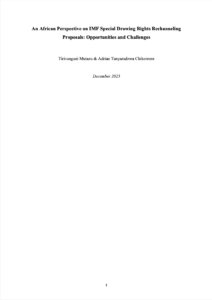SFL launches a commissioned report on the use of SDRs on the African continent and the eligibility of different SDR rechanneling proposals. The report is written by two independent researchers from Zimbabwe, Tirivangani Mutazu & Adrian Chikowore. Based on several case studies, interviews with African civil society and policy makers, and a comprehensive study of the different ways in which SDRs can be rechanneled, they conclude:
- During the pandemic, African countries used their SDRs to finance critical COVID 19 health expenditures, build reserves, and service debts. Rwanda currently uses SDR’s to bolster the country’s climate resilience
- SDRs can also bolster climate policies. They could be issued and rechanneled to fund long-term development goals, such as the African Union Agenda 2063 and the global Sustainable Development Goals
- Rechanneling SDRs via the IMF can contribute to additional loans to low-and middle-income countries. However, these loans come with certain conditionalities and the IMF rechanneling trusts have limited capacity
- The rechanneling proposal developed by the African and Inter American Development Bank (the Hybrid Capital Instrument) deserves merit because it substantially boosts access to finance for development and climate action through leveraging each rechanneled SDR 3-4 times, while building on the expertise of these development banks
- A fundamental reform of the global financial architecture is needed. For example, future SDR amounts and allocations should be based on need, while taking account of the impact of future global crises
Download the report here.
For a recording of the webinar on climate finance organised by SFL, Beyond Bretton Woods and Global Citizen, where Tirivangani Mutazu presented the report, click here.



